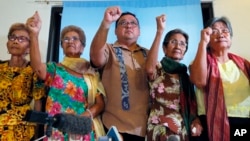A group of elderly Filipino women raped by Japanese troops during World War II called for compensation from Japan on Wednesday, following Tokyo's pledge of $8.3 million for South Korean women forced into Japanese military-run brothels during the war.
The women's lawyers said they were also exploring the possibility of filing cases with United Nations bodies and holding Philippine President Benigno Aquino III liable for allegedly failing to support the case of the women against Japan.
Isabelita Vinuya, the 84-year-old president of Malaya Lolas — a group of Filipino women abducted and raped by Japanese troops in their village — urged the Philippine government to support their demand for justice from Japan.
"We have appealed more than once or twice to our government to help us, support us before Japan so that we can be given justice for the sufferings we went through during World War II," Vinuya said at a news conference, adding that many of the women have died without seeing justice.
Japan and South Korea announced last week that they had settled their decades-long standoff over wartime sex slaves, with Japanese Prime Minister Shinzo Abe apologizing and agreeing to contribute 1 billion yen ($8.3 million) for a foundation to help support the victims. Historians say tens of thousands of women from around Asia were sent to front-line military brothels to provide sex to Japanese soldiers.
"Is there a difference in the rape of a South Korean and a Filipino woman?"
Harry Roque, the Filipino victims' lawyer, said at Wednesday's news conference. "The answer is there should be none, because rape is a crime against women and is prohibited by international humanitarian law and is recognized as an international crime."
He noted that South Korea's Supreme Court had ordered the government to fight for the rights of the Korean victims, but that the Philippines' top court dismissed in 2010 a case filed by Vinuya and 70 other women urging the court to compel the government to press their claims against Japan. The Philippine court also denied an appeal filed by the women.
Vinuya said she was 13 when the Japanese troops raped women and children in her village of Mapaniqui in Pampanga province, around 60 kilometers (37 miles) north of Manila. The troops also razed homes and killed men in the village. Three other women at Wednesday's news conference said they were teenagers when they were raped during the siege.
Vinuya said that only 32 of more than 90 women from her victims' group are still alive. Only 70 of 174 from another such group, the Lila-Filipina, are alive, according to its head, Richilda Extremadura.
Extremadura also called on Japan to compensate former sex slaves and rape victims from the Philippines and 11 other countries and urged President Aquino to initiate talks with Japan.











